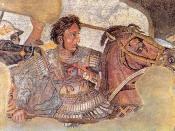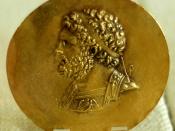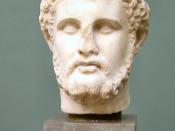These were his last words that the friend had received from the king before he died in his ring, as the symbol of his regency, on the sundown of 10th of June, after the ten day fever, in the Palace of Nabukodonossor. Two of his life's most famous quotes were "I would rather live a short life of glory than a long one of obscurity"1, and "Its better to burn out than fade away"2. By these quotes he meant that he would rather be popular for a short period of time then be unknown for the rest of his life.
Alexandros III Philippou Makedonon was Alexander the Greats' true name at birth. Alexander's parents who loved him and cared for him were King Phillip II of Macedon, and one of his wives, Queen Olympias who was the princess of Epirus, and daughter of King Neoptolemus. Alexander was born in Pella, Macedonia in late July of 356 BC, on the same day which the famous Temple of Artemis at Ephesus was destroyed by fire.
He lived in Pella most of his childhood, and even as a young boy Alexander was fearless and strong. At the age of twelve, he tamed the beautiful and spirited Bucephalus ("ox-head" in Greek), a horse that no one else could ride. Alexander knew the Iliad by heart. He loved Homer, and always slept with a copy of the Iliad under his pillow. His first teacher was Leonidas, a relative of Olympia. Leonidas instilled in Alexander his ascetic nature for which he became famous during his future campaigns. Aristotle was Alexander's second tutor. Alexander from age 13 to 16, together with the other boys belonging to the Macedonian aristocracy, was taught by Aristotle at the Mieza temple, about 30 kilometers from the royal palace at Pella,


